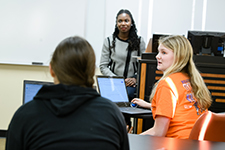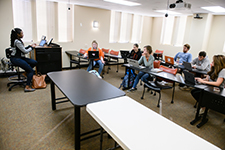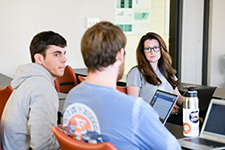THE COTTLE GROUP
Principal Investigator: Dr. Renee Cottle
TEACHING



BioE 3470: Transport Processes in Bioengineering
Description: The goals of this course are to provide an introduction of fundamental engineering principles to analyze mass, momentum, and energy transport in biomedical systems. The focus of this course will be placed on the derivation and solution of mathematical equations to describe transport processes using model systems, and their application to understand how various parameters influence biomedical system behavior. Course material will primarily be provided by online and in-person lectures. Therefore, careful attention in class and note taking will be extremely important. It is highly recommended that the notes from the previous lecture are reviewed before every new class period, which will enhance the continuity of the course material from one lecture to the next.BioE 4420/6420: Biomedical Applications of Gene Regulation and Editing
Description: The course begins with an overview of the basis of genes, the process of how the genetic code gives rise to proteins and is regulated in eukaryotic cells, and genetic mutations. Later we will cover delivery methods and cutting-edge molecular tools for altering protein expression, manipulating the genome, design, analysis and their application. We will explore applications of gene editing for making model organisms for biomedical studies, gene therapy for inherited and acquired diseases, and control of vector borne diseases. The course will conclude with ethical and biosafety considerations of gene editing.BioE 4510 Section 049: Disposable Point-of Care Home Testing Platform for Metabolic Disease
Description: The objective of this Creative Inquiry course is to develop a low-cost, disposable, stand-alone point-of-care diagnostic and monitoring system to enable caregivers of NKH patients to monitor glycine levels at home, adjust the patient’s drug treatment schedule, and improve the patient’s quality of life as well as clinical outcomes. The students involved in this project will get hands-on training and research experience, participate in lab meetings, contribute to scientific publications, and participate in community outreach activities. The proposed project will last beyond two semesters.The students will conduct and write a literature review on diagnostic tools for monitoring amino acid levels. The students will get hands-on training and research experience involving: designing an assay to measure glycine levels in blood samples, design and conduct chemical testing experiments to measure glycine levels in volunteer blood samples, and analyze and interpret data. The students will also participate in weekly lab meetings to discuss research updates and experiments, and relevant studies from the literature.
BioE 4510 Section 045: Precise Gene Editing in Mammalian Cells
Description: The objective of this Creative Inquiry course project is to optimize CRISPR-Cas9 nucleases and homologous donor template DNA for achieving high levels of gene modification in target cells. This project will involve testing different donor template designs along with CRISPR-Cas9 nucleases and investigate the effects of various design parameters on gene modification levels in cells. The students involved in this project will get hands-on training and research experience, participate in lab meetings, contribute to scientific publications, and participate in community outreach activities. The proposed project will last beyond two semesters.